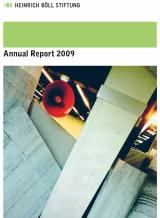Annual Report 2009
Climate change, the global food crisis, and poverty continue to pose enormous challenges to international politics. While the global fi nancial crisis has had an impact on every country in the world, it has wiped out progress toward development particularly in the poorest countries. The ongoing war in Afghanistan, the instability of states such as Pakistan, and the continuing tensions in the Middle East present major challenges to foreign and security policy. The issues of arms control and nuclear disarmament have become increasingly urgent. And in many countries, democratization processes are experiencing alarming setbacks.
These are just a few of the key developments and conditions confronting the international work of the Heinrich Böll Foundation. For us, these challenges represent both an obligation and an inspiration to help overcome current and future crises through the development of new political concepts and alliances.
The failure of the Copenhagen Climate Change Conference (COP 15) does not signal the end of climate policy. We know that solutions to the problems of climate change, the economic crisis, the global food crisis, and international poverty are tightly interlinked. Furthermore, there is increasing awareness and agreement that climate protection can serve as a key driver of new prosperity. We are standing at the transition point between the fossil fuel-driven industrial age and a new epoch of sustainability – and this means a heightened emphasis on renewable energy sources, resource-effi cient technology, and environment-friendly products. The Heinrich Böll Foundation is actively involved, with numerous projects and partners, in shaping this great transformation.
The vision of “ gender democracy ” is one of the foundational principles and driving forces that underlies both our organization and our work. The fruits that this idea has borne in our international work have now been pooled together for the fi rst time in our publication, Gender Politics Makes a Difference. The Foundation’s Gunda Werner Institute (GWI) is a special hub for efforts to implement our guiding principle of gender democracy. Through such activities as our Ladies Lunches, our men’s forums, and our continuous focus on such priority topics as “ gender and security ”, the Foundation has become a leading address in the fi eld of gender policy.
Our new headquarters in the heart of Berlin now provides a forum for events in a wide variety of formats ranging from major international conferences to art exhibits, concerts, and theater performances. Two outstanding examples in 2009 included the summertime guest performance by Berlin’s Neukölln Opera Company at the Foundation headquarters, as well as the highly regarded art exhibition “ nochnichtmehr – action in unmarked spaces ”.
The Foundation’s scholarship program has also enjoyed major advances in recent years. The number of program fellows has grown at a rapid pace, and we have succeeded in expanding our networking and outreach activities for program alumni while also continuing our fellowship program to help young immigrants gain a solid foothold in the journalism profession. This Annual Report highlights the central priorities and activities that characterized our work in the past year. Of course, current information is always available on www.boell.de.
Berlin, April 2010
Ralf Fücks Barbara Unmüßig
Presidents, Heinrich Böll Foundation
Product details
Table of contents
- Foreword
- Globalization and Sustainability
- European Policy
- International Democracy Promotion
- Economy, Social Issues and Financial Crisis
- Foreign and Security Policy
- Gender Policy
- Scholarship Program
- Art and Culture
- Heinrich Böll House Langenbroich
- Prominent Guests and Partners
